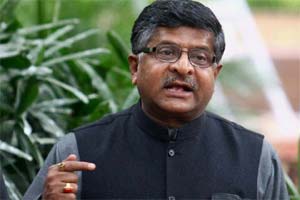With the recently concluded spectrum auctions having fetched the government a record R1.1 lakh crore, telecom minister Ravi Shankar Prasad said on Tuesday he will now expedite policies to help the industry consolidate and enhance its business proposition.
Prasad told FE in an interview that spectrum sharing and trading guidelines would be framed to ensure operators are able to utilise them to their advantage.
He even hinted that the department of telecommunications was willing to examine the feasibility of spectrum leasing if the industry suggested it.
Prasad exuded confidence there wouldn’t be any tariff hike by the operators since the business proposition had become attractive on the back of a rising subscriber base, growing penetration of smartphones and the growth of internet and e-commerce. Moreover, he said, the space had become competitive.
Spectrum sharing and trading guidelines being framed by DoT are to be finalised shortly. The rules may allow mobile operators to ‘rearrange’ their spectrum holdings with one another, in adjacent and non-adjacent areas, such that they are able to create contiguous blocks of airwaves. This would help them provide better data services.
Prasad said the guidelines would allow telcos to operate more efficiently and would be based on the recommendations of the Telecom Regulatory Authority of India .Trai has suggested the government allow carrier rearrangement among operators without charging any fee. The biggest factor inhibiting good data services today is the lack of large blocks of contiguous spectrum, a problem that can’t be solved by simply sharing or trading.
When asked if he was willing to go beyond sharing and trading and allow spectrum leasing, which would also allow state-owned operators BSNL and MTNL to monetise their spectrum holding, Prasad hinted at the possibility: “The spectrum regime would be made more transparent and efficient and if any such suggestions in the direction are made, we are willing to making them available.”
Under spectrum trading, outright transfer of spectrum is allowed, which means that the ownership of the usage right is transferred to the buyer.
If implemented, in case an operator feels it has spectrum it cannot utilise properly, it can sell it to another operator after paying a marginal charge to the government. Under sharing, Trai has allowed two operators to pool together their spectrum to create greater efficiency. However, under leasing, the ownership would vest with the operator to whom it has been assigned but if its utilisation rate is poor it can lease it to another operator on rent and take it back once it finds requirement for it. This way operators with a low subscriber base — say 50-60% — can lease the airwaves to bigger operators with over 90% utilisation and earn revenues. It would be a win-win situation for all.
Saying that the auction was conducted with utmost transparency by the government, Prasad added, “I must compliment all the operators for making the auction a success and also the DoT officials. I think all the operators are aware of strong consumer interest, good quality market and the passion of the Indians for technology. As such am sure they will not resort to any tariff hike.”
Prasad also said the notion that there was spectrum scarcity has been proved wrong. “We put 67% more spectrum for auctions than what was available due to licence renewal. Spectrum in all the bands were offered which offered flexibility to the operators to keep shifting while bidding and even in 2100 MHz, where we were criticised for offering only 85 MHz, still 15 MHz remains unsold,” he said.
Call Signal:
* Operators may be allowed to ‘rearrange’ their spectrum holdings with one another to create contiguous blocks of airwaves
* This would help them provide better data services
* Spectrum leasing could allow BSNL, MTNL to monetise their airwaves
* Better business proposition and competiveness should help operators avoid hiking tariffs
